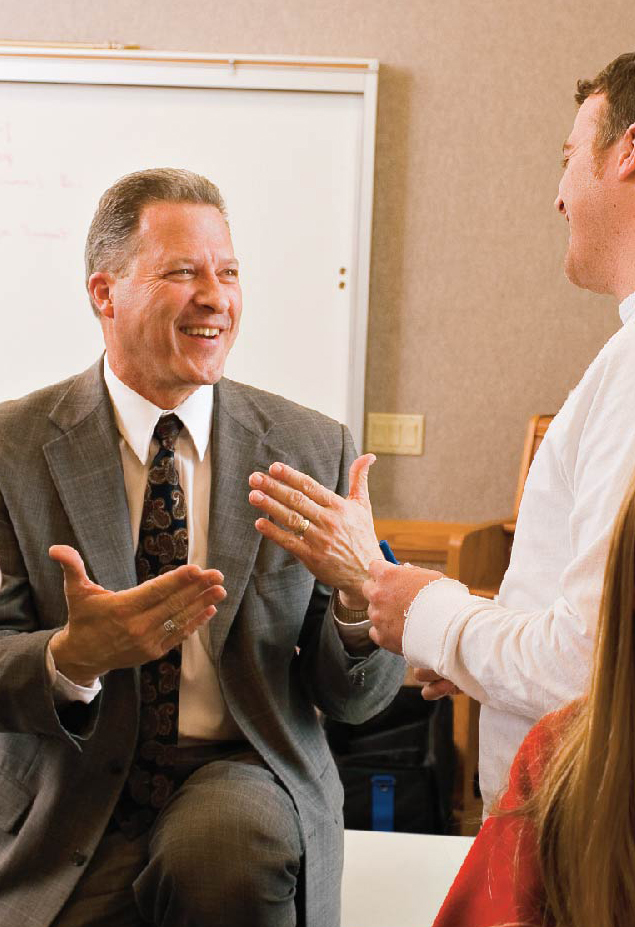How Institute Affected My Life
Larry W. Tippetts
Larry W. Tippetts, "How Institute Affected My Life," Religious Educator 12, no. 3 (2011): 221–227.
Larry W. Tippetts (LTippetts@comcast.net) recently retired from the Seminary and Institute program after forty-two years of teaching.
 Institute has a powerful, life-altering influence on the lives of teachers and their families ass well as on students. Matt Reiler, ©Intellectual Reserve, Inc.
Institute has a powerful, life-altering influence on the lives of teachers and their families ass well as on students. Matt Reiler, ©Intellectual Reserve, Inc.
C. S. Lewis got it right when he described the human condition as a series of peaks and troughs—highs and lows.[1] I think for the most part we succeed in concealing from others in the public sphere the negative side of that mortal mood swing. Consequently we tend to look at others and make assumptions that all is well in their lives. I remember President Henry B. Eyring teaching once that if we will approach every person we meet with the notion that they are having a difficult time, we will be right at least 50 percent of the time.[2]
My purpose is to help you realize that your teachers too have their ups and downs and desperately need the strength provided by the structure and program of the institute. Many institute students look at their teachers and think that all is well, that their teacher’s lives follow a smooth and ever-ascending path through a pleasant mortal experience that will culminate in eternal bliss. I believe that the lives of our teachers are generally very exemplary and filled with much happiness and joy. However, if students could peek into the homes and hearts of their teachers, they would soon recognize that none are spared the tests of mortality. One difference—and this is crucial—is how committed teachers respond to their difficulties. That response is simply the daily subject matter of the typical institute class—staying very close to Christ and seeking to be humble and teachable as we battle the natural man and the fallen world that we live in.
 The understanding, strength, and vision I received from associating with students enabled me to live an ever-increasing life in the Spirit. Matt Reier, Copyright Intellectual Reserve, Inc.
The understanding, strength, and vision I received from associating with students enabled me to live an ever-increasing life in the Spirit. Matt Reier, Copyright Intellectual Reserve, Inc.
It might surprise some students to learn that there are occasions when the hard circumstances of life result in their teachers’ slipping into a sort of depression, the blues, or other negative states that will not easily depart. You’ve had those kinds of experiences yourself. When I experience those dark nights of the soul, they alter the way I see everything around me. There seems to be a giant void in my life that the normal activities of my day no longer seem to fill. This is always somewhat startling to me, even though it happens from time to time, and I should see it as a normal part of the life cycle. Perhaps that void is an inevitable occurrence in mortality—a blessing in disguise that forces us to seek Christ with renewed vigor and intensity. As I have matured, I have learned to stay steady and look forward with an assurance that this too will pass. But this happens only if I put forth the effort required and return to the basic spiritual disciplines that have shaped my life—praying with greater faith and sincerity, pondering deeply the word of God, listening intently to the quiet voice of the Spirit, and giving of myself in service to others.
My work is an unsurpassed blessing in my life. Those of you wrestling with the various occupational options available to you know how important it is to find employment that not only will provide for your temporal needs but also will be personally fulfilling. We often speak of the impact institute has on the lives of students, but I testify that institute also has a powerful, life-altering influence on the lives of teachers and their families.
Teachers and Their Families
Probably the majority of life’s most difficult challenges revolve around relationships—especially family relationships. Every teacher that I have known well has faced their share of adversity in the form of childrearing problems, health crises, serious financial pressures, marital stresses and pains, in-law problems, and other circumstances that seem almost insoluble at times. I recall occasions when, in great discouragement, I left my home to drive to the institute, feeling totally incapable of standing before a classroom filled with students who had come to be lifted. I found myself pleading with the Lord as I drove, falling to my knees in my office, and doing whatever else I could do to repent, improve, shake off self-pity, and overcome the darkness or sadness I was experiencing.
When students do not feel good spiritually, some simply choose not to attend class. When I didn’t feel like teaching, I did not have the luxury of skipping class (fortunately). So I came to class, and miracles occurred. The power of the word is very real. The Holy Spirit and the eager faces of young students enabled me to overcome sadness, sin (and even migraine headaches)! Through experiences in and out of class, I have learned that my agency extends not only to controlling my behavior and my thoughts, but even to my ability to manage my moods and negative emotions. I cannot overstate the importance of this truth.
Not only has the institute program lifted me from the challenging times, but it has also enabled my spirit to soar to heights of understanding and insight that seemed to almost remove the veil between mortality and eternity. The understanding, strength, and vision I received from teaching and associating with students, faculty, and staff enabled me to live an ever-increasing life in the Spirit and bring home a portion of that Spirit to bless my wife, my children, my neighbors, and ward members.
Teachers and Their Students
Notwithstanding its many rewards, teaching the gospel can be a risky endeavor. Hypocrisy, the sin denounced most severely by the Lord during his mortal ministry, is one of our occupational hazards. For this reason I have always felt that I should never ask my students to live in a manner that I was not also sincerely trying to live—personal integrity, scripture study, writing in my journal, fasting, avoiding inappropriate entertainment, and so forth. The Apostle Paul said it well, “Thou therefore which teachest another, teachest thou not also thyself?” (Romans 2:21).
There is nothing more important in this life than our personal spiritual formation in Jesus Christ. The most important thing happening in our lives at any given moment is the kind of person we are becoming. One of my personal themes is the following statement by George MacDonald: “To be [a] disciple of Christ is the end of being; . . . to persuade men to be his disciples is the end of teaching.”[3]
With these thoughts in mind, you will understand that the daily tutoring I receive in the institute building from the spirit, the scriptures, the living prophets, my students, and my fellow teachers is a blessing for which I will be eternally indebted to God. While teaching scripture courses, marriage preparation courses, and other classes, I have emphasized several skills and principles to my students that have been life changing for me.
Receiving Personal Revelation
The institute classroom is one of most inspiration-friendly places we can be in—for both students and teachers. Few principles of the gospel engage my spiritual juices more than the opportunity to receive guidance from God. Our loving Father has given each of us two precious gifts to aid us in our mortal journey: personal agency and personal revelation! The personal revelation comes in the form of light and truth to our hearts and minds. At a university setting we understand something about “learning by study,” but a complimentary skill is to learn what the Lord meant when he said we must also “learn by faith” (D&C 88:118). Learning by faith requires two dimensions missing in “learning by study” alone—the influence of the Holy Spirit (personal revelation), and the application of truth into one’s very being. That is what is meant by “understanding with our hearts” (see Mosiah 12:27; 3 Nephi 19:33).
 The institute classroom is one of the most inspiration-friendly places we can be - both for students and teachers. Matt Reier, Copyright Intellectual Reserve, Inc.
The institute classroom is one of the most inspiration-friendly places we can be - both for students and teachers. Matt Reier, Copyright Intellectual Reserve, Inc.
Writing
As a tool to help me hear the voice of the Lord, I have learned that it is crucial for me to write. I not only record my efforts at personal growth, my goals and decision, but also the struggles I am going through as well. This process of writing opens the door to spiritual impressions that, sooner or later, always come, sometimes at unexpected times. For this reason I am seldom without a small pocket tablet or 3 × 5 cards and a pen. Next to prayer and scripture study, writing the feelings of my mind and heart is the single most helpful spiritual discipline of my life. I testify that God knows, loves, and speaks to me and to all of His children, and I desire to help my students learn to recognize, write down, and seek to apply the guidance of heaven. The discipline of learning to recognize the voice of the Lord, writing it down, and then acting on it, is part of every class I teach.
Attributes of a Disciple
Institute helps me become more like Christ. While teaching Religion 333, “Teachings of the Living Prophets,” during the administration of Ezra Taft Benson, I became convinced that one of my major stumbling blocks was pride.[4] The prophet also taught that the great antidote to pride was humility and submissiveness. So began a personal quest to purify my life of the pride, which is manifest in multitudinous attitudes and behaviors in all of us. In the process I have sought to overcome the hypocrisy in my life that prevents me from having the sincerity and integrity necessary to fulfill my responsibilities as a teacher—and even more as a husband and father. I have a long way to go, but I feel God’s joy in my efforts, and I know he is pleased with my progress.
In my office is a file drawer with an ever-growing folder of the class rolls containing the names of the students I have been privileged to teach over the past forty-two years. Those students are sacred to me, for they have blessed my life with their encouragement, insights, faith, and application of gospel principles. In my journal are recorded my aches at some of the difficult circumstances they have had to face as well as joy over the goodness of their lives. Many are among the heroes of my life. Occasionally when I found myself feeling less than adequate, a student’s expression of appreciation would literally infuse new hope and light into my life. As I have looked deep into the eyes of my students, I have seen goodness and potential that far surpass my own limited abilities, and I feel renewed confidence that the future of the Church is in good hands.
I do feel bad for institute students who do not live up to their privileges for one reason or another. At one extreme are the discouraged and lonely, those ready to give up on themselves, the Church, and life. On another extreme I see the casual, those Elder Neal A. Maxwell described as “honorable but not valiant.” They are not really aware of the gap between where they are and where they ought to be, nor of the importance of closing it.[5] And I also feel bad for the large number of students and young adults who never walk through the door of an institute building. Their souls are precious.
I love the institute, for it provides me a setting, a sacred space to practice obedience to truth as I prepare myself to help young people going through similar struggles. We are all in this together.
It is my sincere hope and prayer that each who reads this article will look deep within your heart and consider what kind of a difference teaching seminary or institute might make in your life. As for your students, we want those who attend sporadically or enroll late and drop out early to consider what impact investing themselves more wholeheartedly in an institute class might have on their happiness and ability to maneuver through the difficulties of mortality We want them to be strengthened and lifted every time they enter the building. We want them to leave institute fortified with depth of testimony and practical skills for spiritual formation that will serve them today, this year, and for the rest of their earthly journey.
For me, I can say without qualification, institute has helped me to see myself more clearly through the eyes of my Savior, bear the burdens of life, and plant my feet firmly on the gospel path. George MacDonald was right: “To be [a] disciple of Christ is the end of being; . . . to persuade men to be his disciples is the end of teaching.”
Notes
[1] C. S. Lewis, The Screwtape Letters (New York:HarperCollins, 2001), ch. 8, 43, 45.
[2] Henry B. Eyring, “In the Strength of the Lord,” Ensign, May 2004, 16.
[3] George MacDonald, Unspoken Sermons (Whitethorn, CA: Johannesen, 1999), 536.
[4] See Ezra Taft Benson, “Cleansing the Inner Vessel,” Ensign, May 1986, 4–7, and “Beware of Pride,” Ensign, May 1989, 4–7.
[5] Neal A. Maxwell, “Swallowed Up in the Will of the Father,” Ensign, November 1995, 22).
